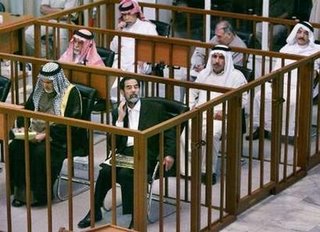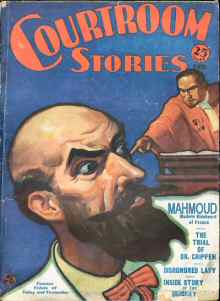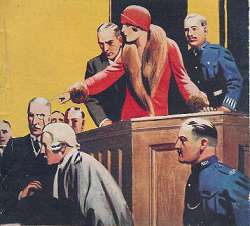Police have arrested a Dutch national once sought by the United States on suspicion of supplying thousands of tons of ingredients for mustard gas and nerve gas to the Iraqi government of Saddam Hussein. "The man is suspected of supplying thousands of tons of raw materials for chemical weapons between 1984 and 1988 to the former regime in Baghdad," the public prosecution service said in a statement Tuesday.
The 62 year-old suspect, identified as Frans van Anraat on Dutch television, was arrested in Amsterdam Monday. The United Nations described him as Saddam's most important middleman for acquiring chemical materials, prosecutors said. "The chemical weapons were used by the Iraqi government in the war against Iran and against the Kurdish population in north Iraq," the statement said. Iraq used chemical weapons to kill 5,000 Iraqi Kurds in the town of Halabja in 1988 and fought a brutal war with Iran from 1980-1988.
Van Anraat is suspected of breaching the law of war and of complicity to genocide, and will be brought before a court in the Dutch town of Arnhem later this week. He is suspected of having had direct contact with Iraqi authorities and using financial fronts to cover his tracks, according to the international investigation which led to the arrest. He worked through a Panamanian company based in Lugano, Switzerland, according to investigations by authorities in the Netherlands, the United States, Switzerland, Italy, Germany, Belgium and Jordan. The inquiry centered on 36 deliveries of raw materials for chemical weapons. The ingredients for mustard gas and nerve gas came from Japan and the United States.
A criminal investigation by U.S. customs authorities based in Baltimore a few years ago found that Van Anraat had been involved in four shipments of thiodiglycol, an industrial chemical used in making mustard gas, to Iraq.
The shipments originated in the United States, were shipped to Europe and reached Iraq after passing through Belgium's Antwerp port and Aqaba in Jordan.
Washington had asked the Dutch government to arrest Van Anraat in December 1997, but police could not track him down, according to a transcript of parliamentary questions to the Dutch Interior Minister last year. The request for his arrest was withdrawn in November 2000, without an explanation.
Van Anraat was detained in Milan in January 1989 following a U.S. request, but he was released after two months. He then headed to Iraq where it is thought he stayed until the U.S.-led invasion of 2003 when he returned to the Netherlands through Syria, the public prosecution said. | Wonder what he knows about Iraq's more recent chemical program? Bet he'd be willing to cut a deal, being he's in it for the money and not a jihadi. |
|
 BAGHDAD - Prosecutors in Saddam Husseins trial for genocide against ethnic Kurds showed graphic footage on Tuesday of dead civilians, including infants, allegedly killed in chemical attacks on their villages.
BAGHDAD - Prosecutors in Saddam Husseins trial for genocide against ethnic Kurds showed graphic footage on Tuesday of dead civilians, including infants, allegedly killed in chemical attacks on their villages.
 THE HAGUE - A court jailed a Dutch businessman for 15 years on Friday after finding him guilty of complicity in war crimes for selling chemicals to Iraq used to carry out gas attacks, but acquitted him of genocide charges.
THE HAGUE - A court jailed a Dutch businessman for 15 years on Friday after finding him guilty of complicity in war crimes for selling chemicals to Iraq used to carry out gas attacks, but acquitted him of genocide charges. A Dutch businessman accused of selling chemicals to Iraq knowing Saddam Hussein would use them for poison gas attacks went on trial in the Netherlands on Monday on charges of complicity in war crimes and genocide.
A Dutch businessman accused of selling chemicals to Iraq knowing Saddam Hussein would use them for poison gas attacks went on trial in the Netherlands on Monday on charges of complicity in war crimes and genocide.